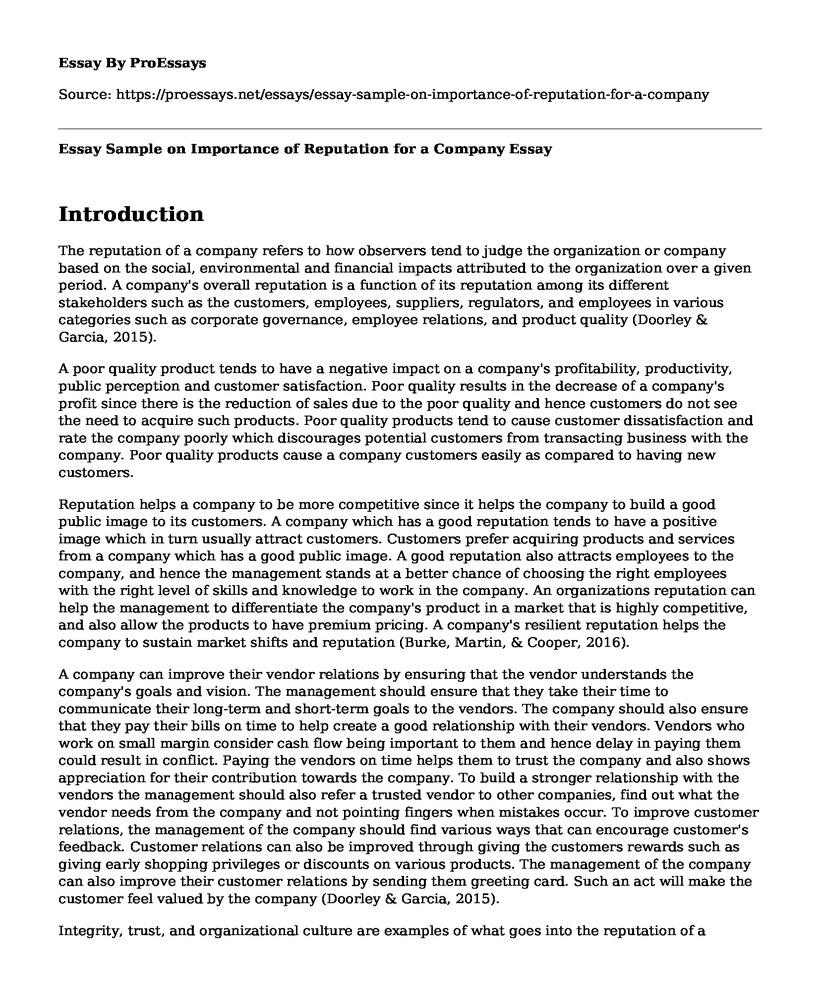Introduction
The reputation of a company refers to how observers tend to judge the organization or company based on the social, environmental and financial impacts attributed to the organization over a given period. A company's overall reputation is a function of its reputation among its different stakeholders such as the customers, employees, suppliers, regulators, and employees in various categories such as corporate governance, employee relations, and product quality (Doorley & Garcia, 2015).
A poor quality product tends to have a negative impact on a company's profitability, productivity, public perception and customer satisfaction. Poor quality results in the decrease of a company's profit since there is the reduction of sales due to the poor quality and hence customers do not see the need to acquire such products. Poor quality products tend to cause customer dissatisfaction and rate the company poorly which discourages potential customers from transacting business with the company. Poor quality products cause a company customers easily as compared to having new customers.
Reputation helps a company to be more competitive since it helps the company to build a good public image to its customers. A company which has a good reputation tends to have a positive image which in turn usually attract customers. Customers prefer acquiring products and services from a company which has a good public image. A good reputation also attracts employees to the company, and hence the management stands at a better chance of choosing the right employees with the right level of skills and knowledge to work in the company. An organizations reputation can help the management to differentiate the company's product in a market that is highly competitive, and also allow the products to have premium pricing. A company's resilient reputation helps the company to sustain market shifts and reputation (Burke, Martin, & Cooper, 2016).
A company can improve their vendor relations by ensuring that the vendor understands the company's goals and vision. The management should ensure that they take their time to communicate their long-term and short-term goals to the vendors. The company should also ensure that they pay their bills on time to help create a good relationship with their vendors. Vendors who work on small margin consider cash flow being important to them and hence delay in paying them could result in conflict. Paying the vendors on time helps them to trust the company and also shows appreciation for their contribution towards the company. To build a stronger relationship with the vendors the management should also refer a trusted vendor to other companies, find out what the vendor needs from the company and not pointing fingers when mistakes occur. To improve customer relations, the management of the company should find various ways that can encourage customer's feedback. Customer relations can also be improved through giving the customers rewards such as giving early shopping privileges or discounts on various products. The management of the company can also improve their customer relations by sending them greeting card. Such an act will make the customer feel valued by the company (Doorley & Garcia, 2015).
Integrity, trust, and organizational culture are examples of what goes into the reputation of a company. They determine how the competitors and other outsiders view the company. A corporate culture which is positive with diligent and satisfied employees tend to be associated with a reputation which is superior.
Conclusion
In conclusion, reputation has a significant impact on a company. A good reputation helps in increasing the profitability of the company, reduces operating costs and helps in customer satisfaction. The management of a company should ensure that they maintain a good relationship with their customers and vendors.
References
Burke, R. J., Martin, G., & Cooper, C. L. (2016). Corporate reputation: Managing opportunities and threats. London: Routledge.
Doorley, J., & Garcia, H. F. (2015). Reputation management: The key to successful public relations and corporate communication. New York: Routledge.
Cite this page
Essay Sample on Importance of Reputation for a Company. (2022, Apr 12). Retrieved from https://proessays.net/essays/essay-sample-on-importance-of-reputation-for-a-company
If you are the original author of this essay and no longer wish to have it published on the ProEssays website, please click below to request its removal:
- Evaluation Essay on Walmart: External and Internal Environments
- Response Essay Sample on Amazon
- Essay Example on Uber: Transforming the Transportation Industry
- Paper Example on Uber: Transforming Mobility Across 50 Countries
- Amazon: Leading Online Retailer Dominating Global Market Share - Essay Sample
- Free Essay Sample on Project Managers
- Workplace Discrimination - Free Report Sample







